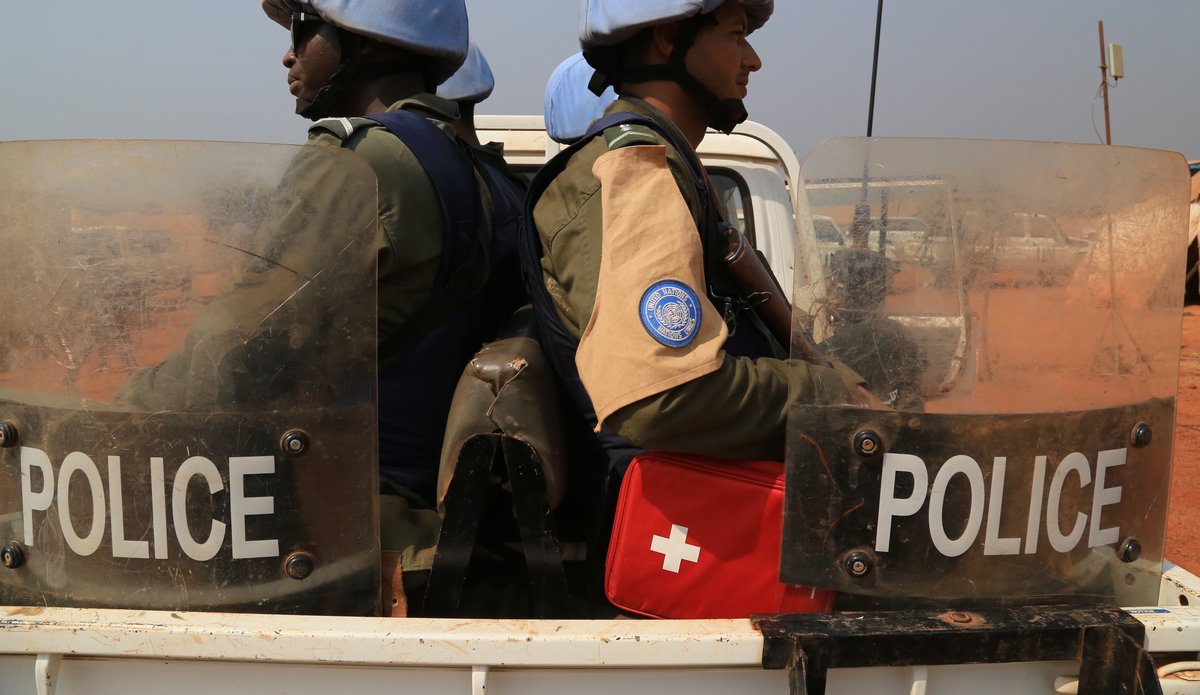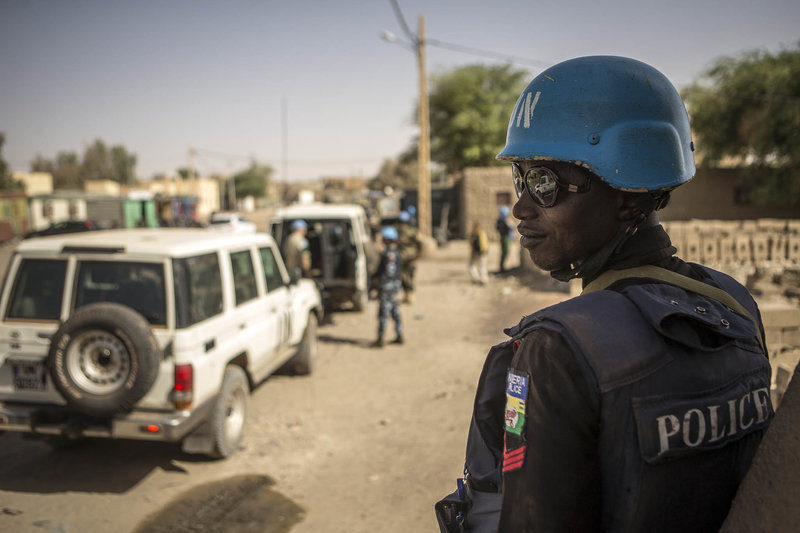FPUs consist of approximately 160 officers with a command staff structure, three to four operational platoons (about 32 officers) and a support element. FPUs rotate usually ever year.
Responsibilities of the Police Division
The Police Division shares with Member States the identified gaps and needs of FPUs in peacekeeping operations, including the need for specialized expertise and capacities, which may include: canine handling, close protection, crime analysis, forensics, investigation, public order management, special weapons and tactics (SWAT), guard units and riverine policing, in accordance with mandated tasks.
Responsibilities of Member States
Out of 90 police contributing countries, several Member States contribute FPUs to peacekeeping operations, including. Member States pledge their interest to deploy Formed Police Units and ensure personnel are fully prepared for their deployments, are fully trained, comply with UN policies, rules and regulations, codes of conduct and command and control arrangements, prior to and once they are in mission, and are held accountable for their actions in international service.
Rules and Regulations
FPUs are deployed as Experts on Mission, under article VI of the Convention on the Privileges and Immunities of the United Nations. FPUs, including contingent-owned equipment (COE), are provided based on a binding Memorandum of Understanding (MoU) including capability requirements, under which the United Nations reimburses the contributing country for the personnel and equipment. The contributing country is responsible for the operational capability of the FPU and the payment of any emoluments, allowances and benefits owed to its personnel under national arrangements.
In consultation with Member States, the United Nations Police Division defined the role and composition of FPUs in the 2016 (revised) Policy on Formed Police Units. For Member States and officers deployed in or preparing FPUs the Guidelines for Formed Police Units on Assignment with Peacekeeping Operations contain information about the operational, administrative, logistical aspects of deployment. To assist Member States with the preparation, the UN Police Division developed minimum training standards in the specialized pre-deployment training materials for FPUs.
Assessment of Operational Capability of Formed Police Units
Before a FPU can deploy, it needs to meet the requirements defined in the assessment of operational capability of FPUs for service in peacekeeping operations (Standard Operating Procedures, 2016). The requirements include eligibility, professional competence and professional conduct for individual officers in the FPU. The unit requirements of operational capacity, in addition, include organisational standards, police techniques in peacekeeping operations, public order management capacity, capacity to provide protection to UN personnel, UN facilities and civilians; and support to capacity building. The Assessment of Operational Capability (AOC) is determined by a United Nations Formed Police Assessment Team (FPAT), deployed at the request of the Member State wishing to deploy an FPU. The assessment is mandatory and clearance is a pre-requisite for service in a peacekeeping operation.
Process
The time between the pledge of a Member State to train, organise and deploy an FPU and the arrival in a peacekeeping operation can take several months.
The sequence below is indicative and might be altered slightly, depending on the availability of resources and the police contributing country.
-
Member States indicate their interest to provide a Formed Police Unit by submitting a pledge to the UN Police Adviser, the Under-Secretary-General for Peacekeeping Operations, the Secretary-General or at UN Summits, such as the Leaders’ Summit on Peacekeeping or the UN Chiefs of Police Summit. The pledge is then registered by the Police Division and in the Peacekeeping Capability Readiness System (PCRS), which was introduced in July 2015. It manages and acts upon pledges of formed police and military peacekeeping capabilities, assisting in their readiness and timely deployment based on UN standards.
-
If a new or emerging police contributing country pledges a FPU, it can invite the UN for an Assessment and Advisory Visit (AAV). The visit helps determine the state of readiness of FPUs for countries that contributed FPUs already or to advise on specific UN operational requirements, policies and procedures and conduct an initial assessment, for new and emerging police contributing countries. Member States that are experienced with deploying FPUs to UN peacekeeping operations may not request an AAV.
-
Based on the assessment of the AAV, the Police Division engages in preliminary discussions with the Member State in preparations of the draft Memorandum of Understanding (MOU), which details the type of equipment and capabilities required of the FPU in a specific peacekeeping operation.
-
Upon initial agreement of the MOU by the UN and the Member State, the UN asks the Member State to provide a mission specific pledge, which the Department of Peacekepeing Operations can accept.
-
Following the formal pledge, the contributing country is invited to conduct a reconnaissance visit to the host-state of the peacekeeping operation, to understand the situation on the ground, necessary logistical arrangements and finalise the type of equipment required for the FPU.
-
The United Nations and the Member State agree on the formal Memorandum of Understanding (MOU) and/or Letter of Assist (LOA), which details the equipment to be provided, the reimbursement rate for equipment, the composition of the officers in the FPU and requirements of operational capability.
-
Upon invitation of the Member State and at least four to six weeks prior to the planned deployment, the UN conducts a Pre-Deployment visit (PDV) to evaluate and assess preparedness and readiness, ensure compliance with UN policies, regulations, procedures and requirements and to finalize the deployment preparations with the Member State. Member States can request the deployment of a United Nations Formed Police Assessment Team (FPAT) to assess the operational capability (AOC) of the FPU as part of the same visit.
-
Upon the results of the assessment of operational capability, the United Nations decides with the Member State on the deployment of the FPU. Upon confirmation of the readiness for deployment by the Member State of the equipment and personnel, the UN receives the load and passenger lists for the transport.
-
The UN, in consultation with the Member State, arranges the shipment of contingent owned equipment (COE) and the subsequent deployment of contingent personnel.
-
Upon conclusion of the equipment and personnel, the UN and the Member State finalize the MOU and/or LOA prior to the arrival of the FPU in the peacekeeping operation.


